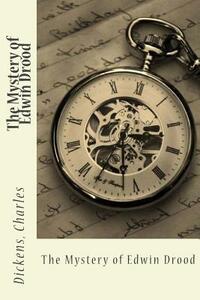Take a photo of a barcode or cover
challenging
dark
funny
mysterious
slow-paced
Plot or Character Driven:
A mix
Strong character development:
Yes
Loveable characters:
No
Diverse cast of characters:
No
Flaws of characters a main focus:
Yes
dark
funny
mysterious
tense
medium-paced
Plot or Character Driven:
Character
Strong character development:
Complicated
Loveable characters:
Yes
Diverse cast of characters:
Yes
Flaws of characters a main focus:
Yes
dark
mysterious
slow-paced
Plot or Character Driven:
Plot
challenging
dark
mysterious
reflective
tense
medium-paced
Plot or Character Driven:
A mix
Strong character development:
Complicated
Loveable characters:
No
Diverse cast of characters:
No
Flaws of characters a main focus:
Yes
I'm iffy on this book, but I'm not really surprised. I was inspired to read this book by Charles Dickens's 200th birthday. Since I recently read David Coperfield, I wasn't in the mood to dive into another long Dickens book. I picked this one, because the book was never finished -- cut short by his death -- so it's shorter.
The book is the story of Edwin Drood's disappearance, and it ends shortly after he disappears. We don't know if he's dead or alive. So there's a lot of setup with little payoff. I read on Wikipedia on how the book was going to proceed, based on notes that Dicken made, and it looks like it was going to get really interesting. But it never got to that point.
This has resulted in some books supplying the lost ending of the book. And there is no lack of adaptations, including one Masterpiece Classic that will be airing on PBS very soon.
It reminded me of my reaction to David Copperfield -- I was not that into the book through much of it, but the last third was so good and really made the book. And, now that I think of it, Great Expectations didn't really get super good until the second half. Dickens's books and characters burn slow until you really get to know them. Or plots develop in interesting ways.
It's also odd to read a Dickens book removed from his usual milieu of London.
Even though the book is inherently a let down, it's still Dickens. And I love Dickens. The last chapter remaining of the book -- the last chapter Dickens ever wrote -- is pretty and vaguely meditative.
I often wonder -- Why does no modern author write a book that is published serially? It seems like an interesting challenge. [I just looked it up, and it looks like there are some examples. I don't follow the book world enough to be plugged into when this happens.]
The book is the story of Edwin Drood's disappearance, and it ends shortly after he disappears. We don't know if he's dead or alive. So there's a lot of setup with little payoff. I read on Wikipedia on how the book was going to proceed, based on notes that Dicken made, and it looks like it was going to get really interesting. But it never got to that point.
This has resulted in some books supplying the lost ending of the book. And there is no lack of adaptations, including one Masterpiece Classic that will be airing on PBS very soon.
It reminded me of my reaction to David Copperfield -- I was not that into the book through much of it, but the last third was so good and really made the book. And, now that I think of it, Great Expectations didn't really get super good until the second half. Dickens's books and characters burn slow until you really get to know them. Or plots develop in interesting ways.
It's also odd to read a Dickens book removed from his usual milieu of London.
Even though the book is inherently a let down, it's still Dickens. And I love Dickens. The last chapter remaining of the book -- the last chapter Dickens ever wrote -- is pretty and vaguely meditative.
I often wonder -- Why does no modern author write a book that is published serially? It seems like an interesting challenge. [I just looked it up, and it looks like there are some examples. I don't follow the book world enough to be plugged into when this happens.]
OMG! The cliffhanger! And it will never be solved. Plus there’s a classic cemetery tour. I highly enjoyed this.
challenging
mysterious
tense
medium-paced
Plot or Character Driven:
Character
Strong character development:
Complicated
Loveable characters:
No
Diverse cast of characters:
Yes
Flaws of characters a main focus:
No
Two men walk down to the river on a stormy night, after resolving a bitter disagreement. Only one man returns. A colorful cast of characters provides a wide range of suspects for a murder that nobody is quite sure has been committed yet.
Okay, so the ending of this book should be spoiled; it's unfinished, as the author died while writing it. The book was published as a serial, though, so the part that's finished really is finished.
I first encountered this story as Drood-the-theater-play, which is witty in spades and lets the audience vote on a whodunnit. I highly recommend that, five stars, pee before the play starts or you're going to wet yourself.
I next encountered this story as Drood-by-Dan-Simmons, which I really need to reread, as I suspect things will make more sense now that I've read more Wilkie Collins and Charles Dickens. But maybe I'll wait until after I've read Henry Mayhew, because I'm sure that's a major source.
And now...the work itself.
It disappointed me, but it does make Drood-by-Simmons make sense. It just isn't as good as The Woman in White or The Moonstone. Wilkie Collins, for all that he could go on and on, had an excellent sense of clues. This? It's obvious who did it, because the author telegraphs this a mile away, and yet somehow manages not to provide decent clues. Granted, this was an early work of mystery fiction, but--if Wilkie Collins could pull it off, why not Dickens?
And, as always, I just have problems with Dickens, who would much rather be writing a church bulletin full of gossip or a list of characters sketches than a novel. Some good turns of phrase, but I got frustrated with the paid-by-the-word attitude and started skimming.
Okay, so the ending of this book should be spoiled; it's unfinished, as the author died while writing it. The book was published as a serial, though, so the part that's finished really is finished.
I first encountered this story as Drood-the-theater-play, which is witty in spades and lets the audience vote on a whodunnit. I highly recommend that, five stars, pee before the play starts or you're going to wet yourself.
I next encountered this story as Drood-by-Dan-Simmons, which I really need to reread, as I suspect things will make more sense now that I've read more Wilkie Collins and Charles Dickens. But maybe I'll wait until after I've read Henry Mayhew, because I'm sure that's a major source.
And now...the work itself.
It disappointed me, but it does make Drood-by-Simmons make sense. It just isn't as good as The Woman in White or The Moonstone. Wilkie Collins, for all that he could go on and on, had an excellent sense of clues. This? It's obvious who did it, because the author telegraphs this a mile away, and yet somehow manages not to provide decent clues. Granted, this was an early work of mystery fiction, but--if Wilkie Collins could pull it off, why not Dickens?
And, as always, I just have problems with Dickens, who would much rather be writing a church bulletin full of gossip or a list of characters sketches than a novel. Some good turns of phrase, but I got frustrated with the paid-by-the-word attitude and started skimming.
dark
emotional
mysterious
slow-paced
Plot or Character Driven:
Character
Strong character development:
Complicated
Loveable characters:
Yes
Diverse cast of characters:
N/A
Flaws of characters a main focus:
Yes






